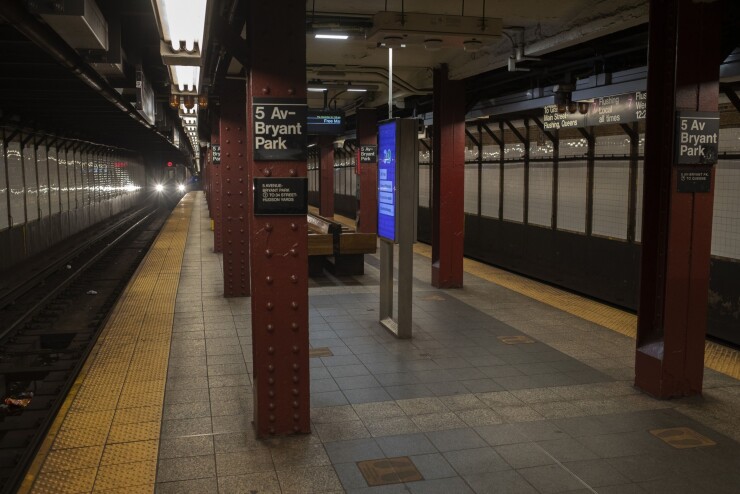As New York’s Metropolitan Transportation Authority weighs its options after receiving a further boost from Washington, its chief financial officer said it will not need to balance its immediate operating budgets through bonding.
The state-run MTA, one of the largest municipal issuers with $49 billion in debt, is in store for roughly $6.5 billion under the American Rescue Plan, the latest COVID-19 federal rescue package that President Biden signed last week. That would raise the total amount it has received from the feds over the past year to $14 billion.
“The use of $2.9 billion in proceeds from the deficit financing we undertook at the end of last year to balance our budget this year and next year will no longer be required,” CFO Robert Foran said at Wednesday’s board meeting. “Our goal is that these proceeds will be the last dollars that we need to balance any future budgets and address deficits.”

The MTA borrowed $2.9 billion last year through the Federal Reserve's short-term borrowing program, the Municipal Liquidity Facility. Only the MTA and Illinois tapped the facility, which closed in December.
S&P Global Ratings, citing the influx of federal cash, revised its outlook on Thursday for the MTA's primary transportation revenue bond credit to stable from negative while affirming its BBB-plus long-term rating.
The authority's February financial plan had allocated $1.65 billion of the $2.9 billion to cover this year's operating deficit, with $1.25 billion for next year. It operates on a calendar year.
"We will still keep those proceeds available, but what our goal will be is to use that as the last dollars necessary to address the deficits in the future," Foran said.
According to Foran, the funding also means the use of state-authorized lockbox funds from Internet sales and mansion taxes to prop up the operating budget is no longer necessary, “which allows us to issue MTA bonds this year, to advance the 2020 to 2024 capital program.”
That five-year program has targeted such projects as signal and accessibility upgrades; access to Grand Central Terminal for Long Island Rail Road commuter trains; Metro-North access to Penn Station with four new commuter rail stations in the Bronx; and Second Avenue subway line expansion into central and eastern Harlem.
The MTA, Foran added, now has the flexibility to proceed on a congestion pricing mechanism for Manhattan, although federal government approval is still needed. New York’s plan could set a marker for other metropolitan areas.
“We’ll see what we can generate, but it should certainly be a significant amount of bond proceeds this year as opposed to having to wait to next year," Foran said.
The board also approved a resolution authorizing the MTA to issue $1.3 billion in Triborough Bridge and Tunnel Authority new-money bonds, notes and refunding bonds. Proceeds will benefit capital projects of the transit commuter systems.
According to data on the Municipal Securities Rulemaking Board's EMMA website, a block of Series 2018B MTA Triborough Bridge and Tunnel Authority general revenue refunding bonds maturing in 2031 that originally priced at 122.779 cents on the dollar and a 1.91% yield, sold to a customer Wednesday at a price of 135.636 cents and a 1.39% yield.
"The receipt of federal fiscal stimulus alleviates pressure on the MTA's credit profile, but the agency still faces considerable challenges to align a fairly inflexible expenditure base against revenues that it estimates will remain below 2019 levels thru 2024," Fitch Ratings said.
With the state budget deadline two weeks away, the MTA also received some encouraging news from Albany. Lawmakers pushing back on Gov. Andrew Cuomo’s attempt to divert $145 million from mass transit.
Budget negotiations are ongoing.
"There's a long way from here to there, and there are more dimensions to this budget than normal," Cuomo told reporters on a conference call. "This has an entire overlay of the federal government funding, so it's complicated."
Overlay could also include Biden's funding and taxing plans for a federal infrastructure bill.
Other open questions for the MTA include ridership and city tourism levels as the pandemic subsides; changing commuter patterns; a spike in crime that included a recent stabbing spree; and the need to rein in costs on such matters as overtime.
While doomsday-type service cuts are off the table, Chairman Patrick Foye said the authority still faces “severe financial stress.”
While Foye said recently that MTA overtime spending fell by $122 million last year, the authority still paid out $1.1 billion in overtime last year. Abuse is still a problem, said the authority’s inspector general, Carolyn Pokorny.
Speaking to the board on Wednesday, she called the integration of timekeeping and payroll technologies a priority. “This project needs to be pushed,” she said.
“Until integration is achieved, management systems will remain inadequate,” she said. “It will allow weaknesses to remain that unscrupulous managers and employees could exploit."
How long and effectively Cuomo himself can govern also casts a looming shadow. Leaders within his own Democratic Party, including U.S. Sens. Chuck Schumer and Kirsten Gillibrand, both of New York, have called on the governor to resign while in Albany, House Speaker Carl Heastie, D-Bronx, has begun an impeachment investigation.
“Investigations are underway,” said Foye, a Cuomo appointee and loyalist. “These, as all have said, are troubling allegations. The investigation is ongoing and it would be inappropriate for me to comment beyond that.”





